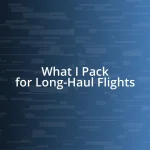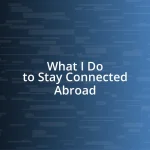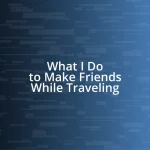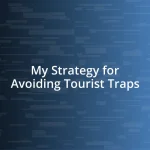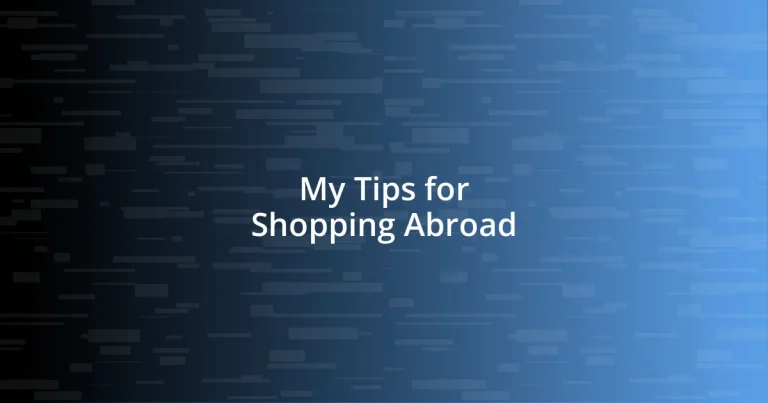Key takeaways:
- Verify voltage compatibility and familiarize yourself with local currency and exchange rates before international shopping to avoid frustration and overspending.
- Explore local markets and seek recommendations from locals to find authentic shopping experiences away from tourist traps.
- Always pack essentials like a sturdy tote, comfortable shoes, and a portable charger to enhance your shopping adventure.
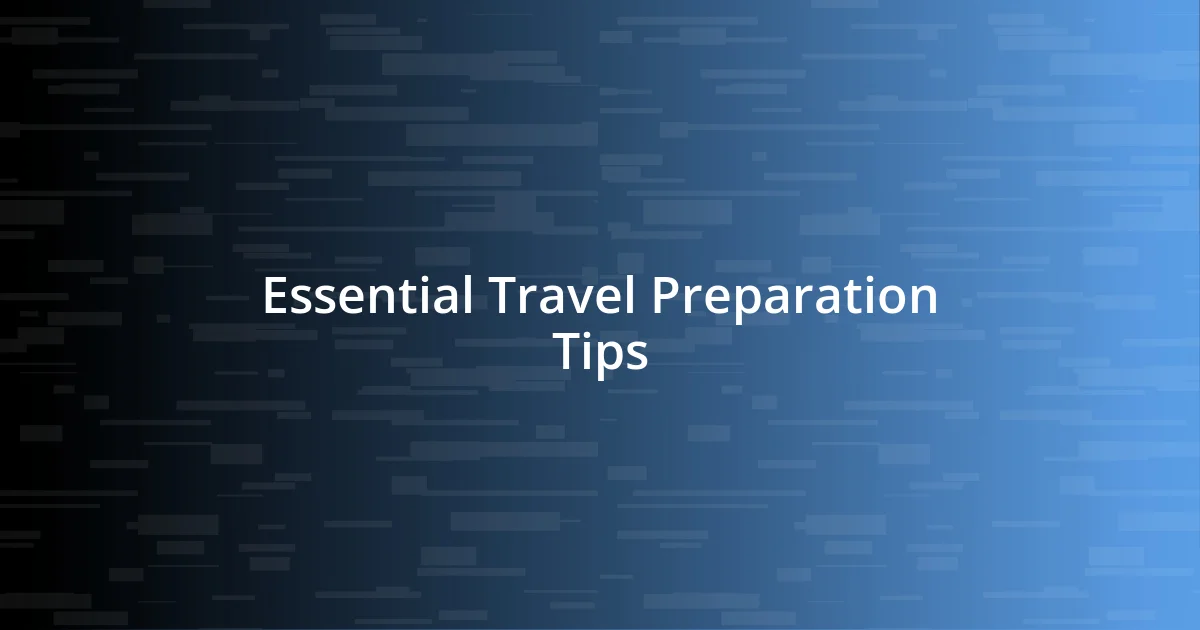
Essential Travel Preparation Tips
Preparing for international shopping can be thrilling yet daunting. I remember the excitement I felt as I packed my bags for Paris, only to realize I hadn’t checked the voltage compatibility for my electronics. Have you ever faced a similar moment? It’s essential to verify that your devices will work abroad to avoid frustration when you arrive.
Another tip I swear by is to familiarize yourself with the local currency and exchange rates before you go. During my first trip to Japan, I was startled at how quickly I lost track of spending without keeping an eye on yen versus dollars. Have you ever felt the panic that comes with not understanding the currency? Knowing what the prices look like can help you budget effectively and ensure you’re not overspending in the heat of the moment.
Lastly, packing light can make all the difference. On my recent trip to Italy, I aimed for a minimalist wardrobe, and it paid off wonderfully. I could easily navigate crowded marketplaces without dragging heavy suitcases through narrow streets. It made me wonder—what would you do if you could travel with only your favorite essentials? Simplifying your packing not only eases your travel but also leaves room for those unique finds you’ll want to bring back home.
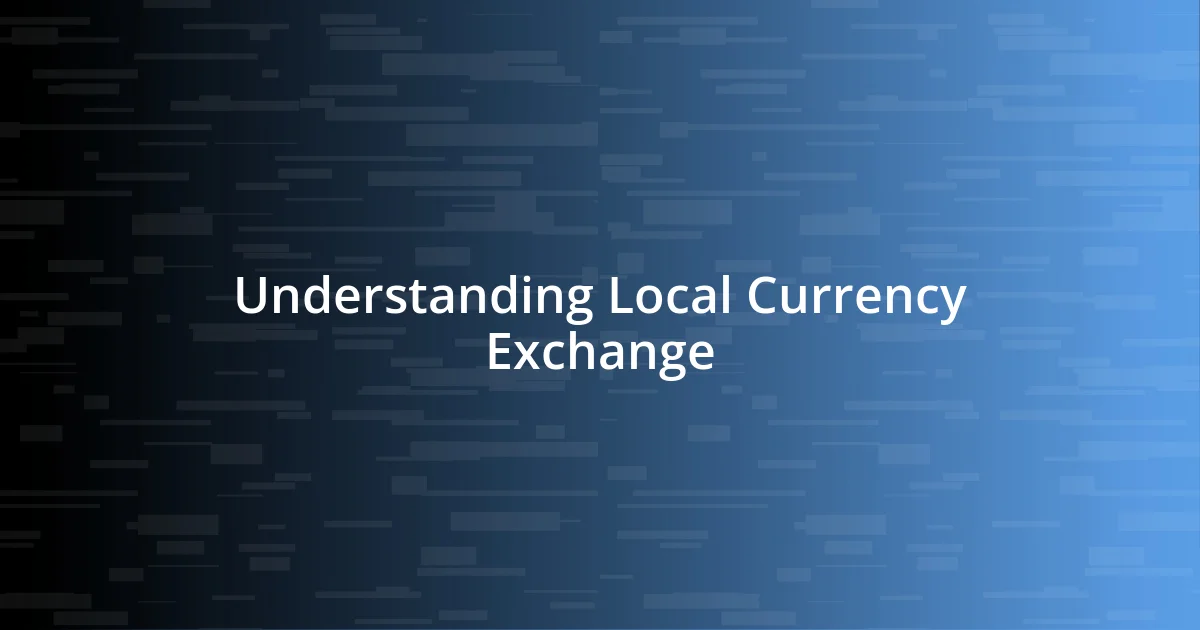
Understanding Local Currency Exchange
Understanding the local currency exchange is crucial when shopping abroad. I vividly remember the first time I arrived in Brazil, feeling both excited and overwhelmed as I exchanged dollars for reais. The shock hit me when I realized that I received surprisingly few reais for my dollars, making me acutely aware of how exchange rates affect purchasing power. Have you ever exchanged currency and felt that jolt of surprise? It made me more diligent about checking rates beforehand.
Choosing where to exchange your money can really impact your budget. On a trip to Thailand, I opted to exchange money at a local bank instead of at the airport, and I was pleasantly surprised to receive a much better rate. This decision not only stretched my budget but also allowed me to indulge in more street food than I initially planned. Have you ever spent too much on fees just to get your hands on local currency? Small differences like these can add up quickly.
Consider using a travel card or mobile payment app as well. During my travels through Europe, I used a prepaid travel card that automatically converted my dollars to euros at a competitive rate. It eased my mind—no more fumbling with cash or worrying about theft. Have you tried using tech for currency conversion? It’s worth exploring as it can enhance both convenience and security.
| Exchange Option | Pros |
|---|---|
| Bank Exchange | Better rates, lower fees |
| Airport Exchange | Convenient, quick access |
| Travel Card | Secure, easy to manage |
| Mobile Payment App | Instant conversion, minimizes cash handling |

Finding Best Shopping Destinations
Finding the best shopping destinations is about knowing where to go and what to look for. I still recall wandering through the bustling souks of Marrakech, completely captivated by the vibrant colors and unique crafts. Each stall felt like a treasure chest! It reminded me that the best shopping experiences often lie off the beaten path. Seek out local markets and hidden gems—these spots often offer authentic items that can’t be found in touristy areas.
Here are some tips for uncovering the best shopping havens:
- Local Recommendations: Ask locals for their favorite spots; they often know the best places that aren’t in guidebooks.
- Social Media and Blogs: Explore Instagram or travel blogs for up-to-date recommendations and unique finds from fellow travelers.
- Cultural Events: Attend local festivals—these events provide a great opportunity to shop for regional specialties and handmade goods.
- Timing Matters: Shop during weekdays when crowds are thinner, allowing for a more relaxed experience and sometimes better prices.
- Explore Beyond Main Streets: Venture into residential neighborhoods; sometimes, the most delightful discoveries are nestled away from tourist traps.
Navigating the shopping scene can feel overwhelming, but I found a bit of research makes all the difference. On a trip to Istanbul, I was determined to find a local artisan who crafted beautiful ceramics. After asking around and some online sleuthing, I stumbled upon a hidden workshop. The owner let me try my hand at painting a tile, which turned out to be a highlight of my trip. There’s an unforgettable thrill when shopping transforms into an experience—it’s those kinds of moments that remind me why I love exploring new cultures.

Navigating Local Customs and Etiquette
When it comes to shopping abroad, understanding local customs and etiquette can truly enhance your experience. For instance, I remember my first encounter with haggling in a Moroccan market. Initially, I felt awkward navigating the back-and-forth with vendors, but I soon realized it’s not just about price—it’s a social dance. Engaging with sellers can lead to richer interactions and a deeper understanding of their culture. Have you ever hesitated to negotiate, thinking it might be rude? I learned that in many cultures, haggling is not only accepted but expected.
Knowing when to shop can also be a matter of cultural sensitivity. During my visit to Japan, I learned that certain days are specific for restock or special sales, particularly at traditional markets. This knowledge allowed me to witness lively communities coming together to shop, turning what could have been just another errand into a vibrant social event. Have you considered how timing can affect your shopping experience? Embracing local shopping customs—like bowing slightly when making a purchase—can be an excellent way to show respect and connect with the local culture.
Lastly, don’t underestimate the importance of greetings and polite expressions. I still smile when I think about my attempts to speak a few words in the local language while shopping in Italy. A simple “buongiorno” or “grazie” opened so many doors for me. It made shop owners appreciate my efforts and often led to delightful conversations about their products. Have you ever noticed how a little kindness can go a long way? Remember, these small gestures of respect can create a more enjoyable and memorable shopping experience.

Bargaining Techniques for Bargain Hunters
When it comes to bargaining, building rapport with the vendor can make a world of difference. I vividly recall a market in Thailand where I struck up a conversation with a shopkeeper about my love for local crafts. Instead of diving straight into price discussions, I shared stories about my travels, and by the end, we reached a price that made both of us smile. Have you ever thought about how personal connections can enhance negotiations? It’s like trading stories for discounts—totally worth the effort!
Another technique I find particularly effective is starting low but being realistic. One time, while haggling for a beautiful handwoven rug in Morocco, I offered half of the asking price. The vendor raised an eyebrow, but we chatted and eventually settled on a fair price that honored the craftsmanship. Have you ever noticed how the first offer sets the stage? It’s crucial to remember that both parties need to feel satisfied for the deal to be successful.
Lastly, always walk away if the price doesn’t feel right. I’ll never forget the time I hesitated to leave a jewelry shop in India. I was enamored with a stunning necklace, but the price seemed too high. As I turned to leave, the vendor called me back with a significantly reduced offer. Have you experienced that thrilling moment when you hold the power in negotiation? Trusting your instincts not only leads to better deals but also adds an exhilarating layer of strategy to your shopping adventure.
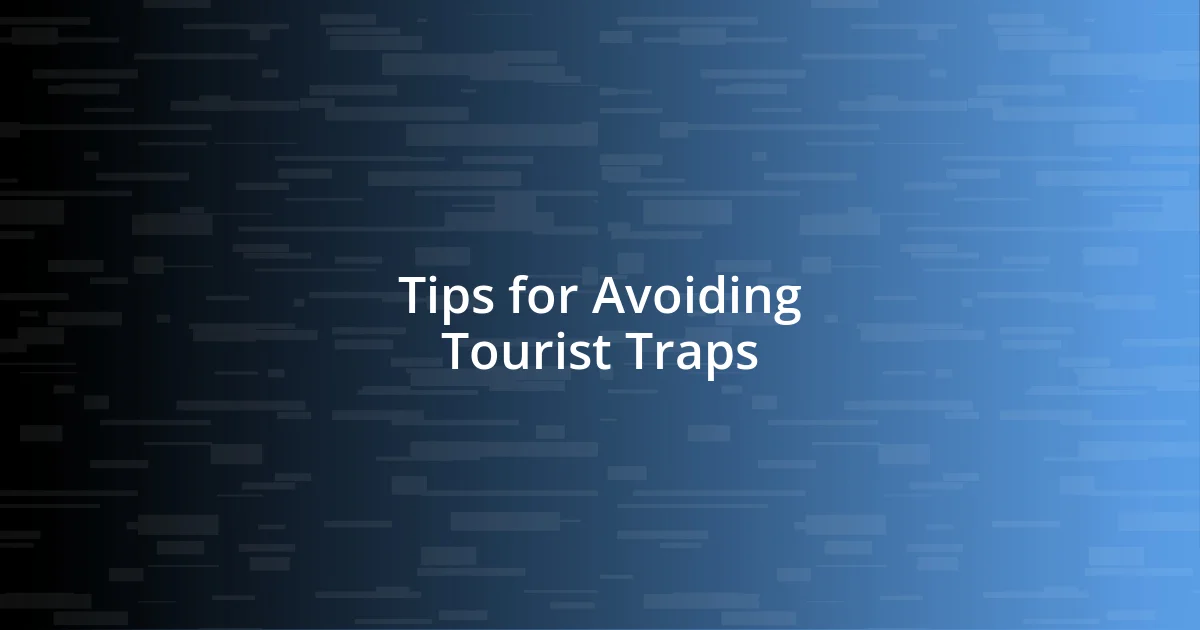
Tips for Avoiding Tourist Traps
When I’m traveling, one of my top strategies to avoid tourist traps is to seek out recommendations from locals instead of relying solely on guidebooks or internet lists. I still remember visiting Barcelona and striking up a conversation with a café owner who pointed me towards a lesser-known artisan market. The items there were authentic, and the atmosphere felt genuine compared to the crowded tourist areas. Have you ever found that local tips unlock hidden gems that transforms a typical shopping day into an adventure?
Another piece of advice that has served me well is to wander off the beaten path—literally. During a trip to Istanbul, instead of heading straight to the Grand Bazaar, I made a deliberate choice to explore the side streets. It was on those quieter roads that I stumbled upon a small shop where a friendly craftsman was weaving carpets right in front of me. Watching him work while chatting over tea was far more enriching than any tourist shop visit. Have you ever noticed that stepping away from crowds often leads to more intimate experiences and unique finds?
Lastly, I trust my instinct when something feels too polished or overly commercialized. I’ll never forget my trip to Bali, where I encountered a seemingly perfect souvenir shop with pristine displays. The prices were sky-high, and my gut told me it just wasn’t right. I decided to explore a nearby village instead and found a small boutique featuring handmade goods that truly represented Bali’s vibrant culture. The shop owner warmly shared stories about each piece, making my purchase feel meaningful. How often do we let our intuition guide us toward more authentic experiences? Listening to that inner voice can often lead to the best shopping adventures.
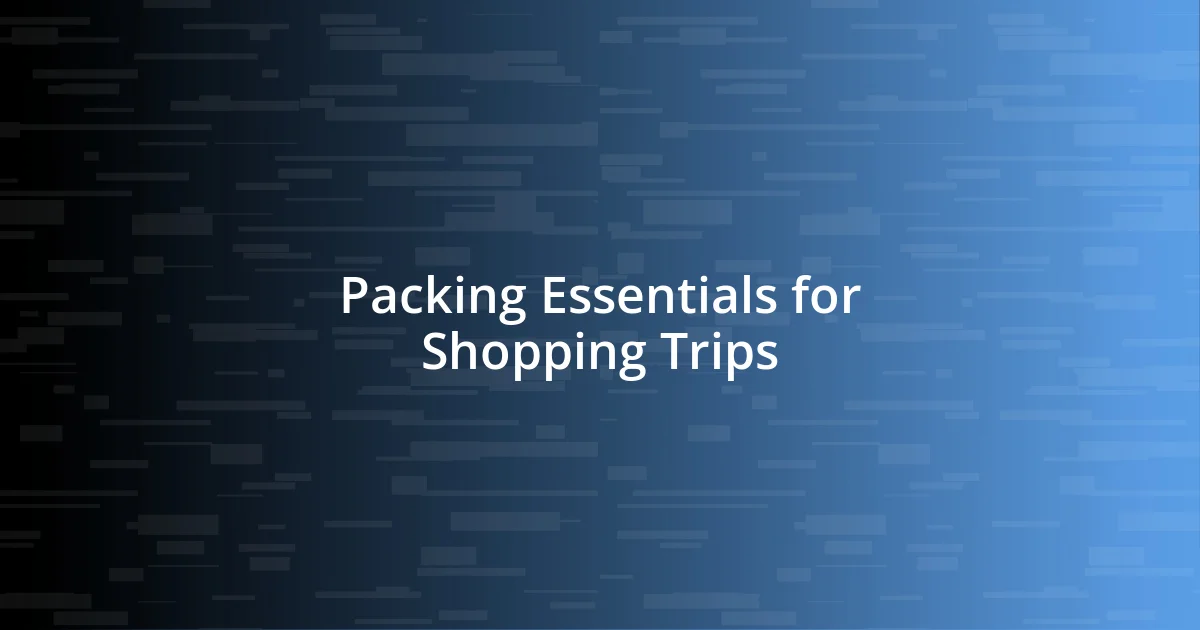
Packing Essentials for Shopping Trips
When I’m packing for a shopping trip, I always make sure to bring a sturdy tote or foldable backpack. This little gem has saved me countless times, especially when I’ve stumbled upon unexpected treasures at local markets. I remember a bazaar in Morocco where I found beautiful ceramics that I just couldn’t resist; having that bag made it easy to carry everything without cluttering my hands. Have you ever thought about how a good bag can transform your shopping experience?
Comfortable walking shoes are another essential I swear by. I once spent an entire day exploring the vibrant streets of Bangkok, and by the evening, my feet were protesting! Trust me, nothing dampens a shopping spree like sore toes. I’ve learned that investing in a decent pair of shoes makes it so much easier to wander and peruse without being hindered by discomfort. What’s your go-to shoe for a long day of shopping?
Lastly, I never forget to pack a portable charger. During a shopping adventure in Florence, I relied heavily on my phone to navigate to different shops and take pictures. But as the day progressed, my battery percentage dwindled, and I started to panic. Thankfully, my trusty charger revived my phone just in time to capture my last find—an exquisite leather handbag! Isn’t it a relief to have backup power in your pocket when you’re out discovering gems?

